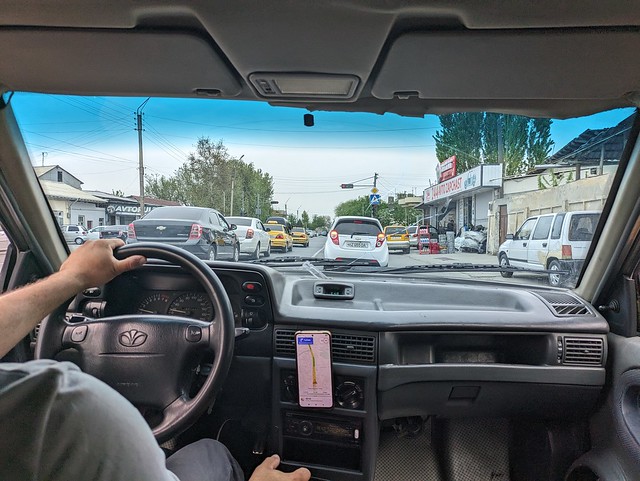From Kokand, we opted for a day trip to the ceramic town of Rishton instead of the silk town of Margilon. Rishton is a sleepy town at the border with Kyrgyzstan. While the distances between the workshops and stores are a bit of a trek, the abundance and beauty of ceramics was remarkable.
Travelers tips for Khujand to Kokand by public transport i.e. how we did it: We took a local bus southeast from Khujand city center to the Kokand Avtovokzal (bus station) for 3 Tajik somoni. Took bus 328 (leaves when full) to Konibodom (Ka-ni-bo-dom) for 15 Tajik somoni. We told the driver we were headed to the border (granitsa in Russian).Then we caught bus 164 to the border. Border formalities were quick and painless. The Uzbek officials were chatty; practicing their English we guessed. There were no money changers on either side of the border. However we had Uzbek soms from our visit 10 days before. The taxi drivers on the Uzbek side were loud, aggressive, and arrogant. So along with 2 local ladies, and a traveling Pole we met on bus 164, we hired a minivan to take us to Beshariq for 10,000 Uzbek soms each. We were dropped off in Beshariq right next to bus 42, signed QO'QON, which for 4,000 soms each, we rode to the Kokand South Bus Station. From there we took a Yandex ride-hail car to the Rohat hotel for 8,500 soms, about 70 US cents.
The Tajik/Uzbek border crossing was uneventful, and the transport good on both sides across 4 buses, one minivan, and one Yandex car (4th below), even though the minivan ran out of gas causing a 20 minute delay. And very kind local folks, except for the taxi drivers on the Uzbek side of the border, got us on the right bus each time we transferred. One bus driver even flagged down the onward bus we needed when he saw it passing by. Amazing!




Vegetarian Uzbek Lagman (Noodle Soup) and Salads for dinner at Kafe Benazir. Note the similarity between the Uzbek word "Lagman" and the Chinese word "Lo Mien" which means a dish with noodles.

One day we walked around Kokand. There is plenty to see. First the Friday Mosque.


Then the contemporary architecture of the Khamza Theatre of Musical Drama (1st below), Museum of the Great Scholars (2nd), and the UZTELECOM Building (3rd.)



Across the street from these modern buildings, we watched men roll out the prayer rugs at the Norbutabiy Madrasa (active) and Mosque.


There is a large cemetery behind the Norbutabiy Mosque with some beautiful domes and gates.




Then over to the Dasturkhonchi Madrasa (Women's Madrasa).

The Palace of Khudayar Khan is a shadow of its former self.



We were pleasantly surprised to find more than several Art Nouveau buildings heading west from city center on Istiqlol Street: Russian-Asiatic Bank (1910) (1910) 1st and 2nd below, House of the Vadyaevs (1911), 3rd below, and the Vysotsky Brothers Tea Packing Company (4th).




Day trip to Rishtan. Before visiting the ceramic workshops, we walked to Hoja Ilgor Mosque, located just a few hunderd meters from the Kyrgyzstan–Uzbekistan border, where a nice man and his son showed us around the mosque, madrasa, and tombs.





Ceramic workshops and showrooms in Rishtan.





The colorful Rishtan Sunday Market.


And back to Kokand in a shared taxi.

No comments:
Post a Comment